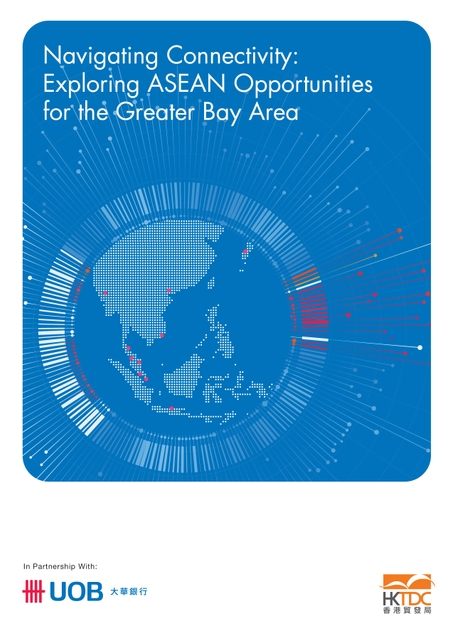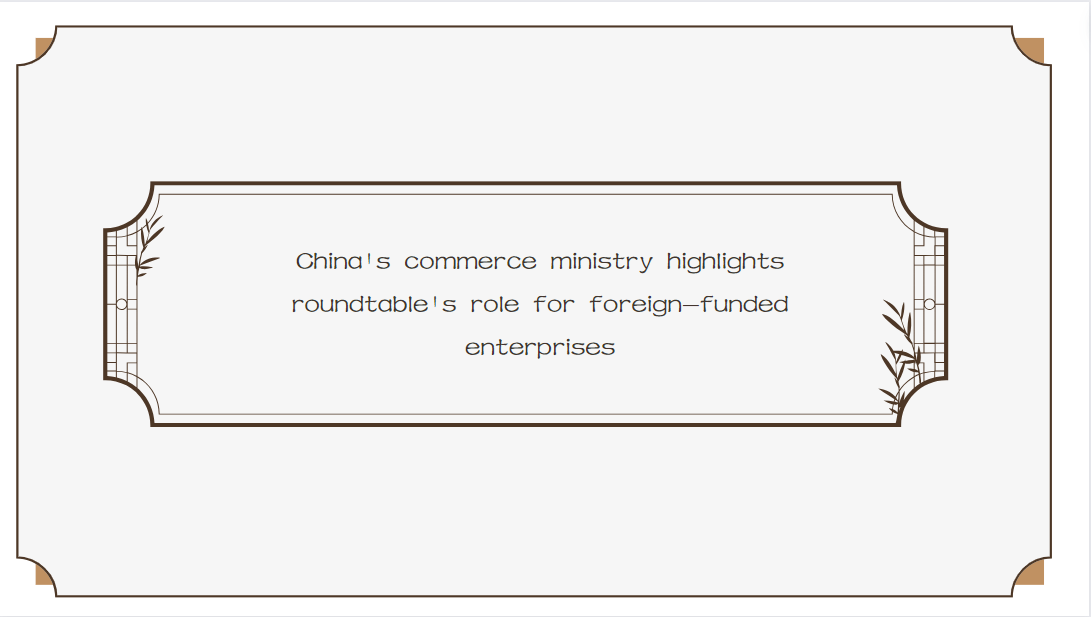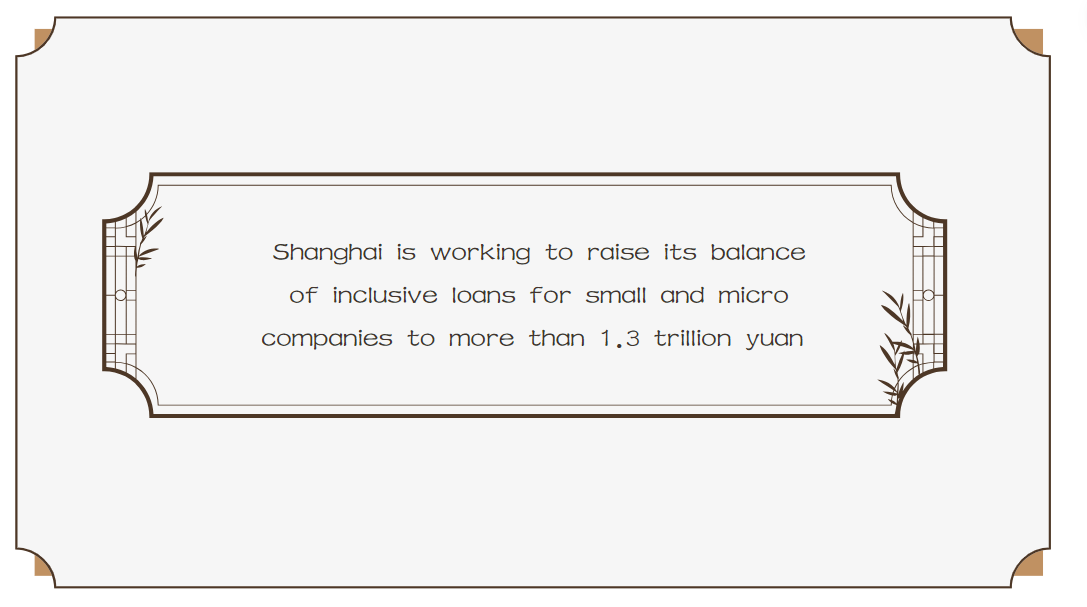Navigating Connectivity: Exploring ASEAN Opportunities for the Greater Bay Area
Please click the image for the full report.
The Association of Southeast Asian Nations (ASEAN) comprises 10 member countries – Brunei, Cambodia, Indonesia, Laos, Malaysia, Myanmar, the Philippines, Thailand, Singapore and Vietnam. With its large, young population and improving business environment, ASEAN is increasingly attracting overseas investment. At the same time, connectivity between China and ASEAN has been improving, with the mainland now the bloc’s largest trading partner, as well as an important source of foreign investment.
With the Guangdong Hong Kong Macao Greater Bay Area (GBA) having a focus on high end development, many of its businesses are now looking to expand well beyond its borders. In line with the GBA development plan, connections between Hong Kong and its GBA partner cities have been multiplying. This has all been bolstered by the ASEAN Hong Kong, China Free Trade Agreement, which came into full effect in February 2021. Essentially streamlining the delivery and management of trade and investment initiatives between the ASEAN bloc, the mainland GBA cities and Hong Kong, the agreement has played an important role in boosting the trade and investment flow between the three parties.
Looking to gain a greater understanding of the dynamics of the growing engagement between the three parties, in the third quarter of 2023, HKTDC Research and United Overseas Bank Hong Kong (UOB Hong Kong) jointly conducted a questionnaire survey of 671 GBA enterprises and in depth interviews with 10 companies. The overall objective was to get a clearer picture of the post pandemic trade and investment trends among those GBA enterprises active in the ASEAN market, as well as to define and explore the role played by Hong Kong. The results of the survey were then compared with the findings of an earlier joint report from 2021 – Trade and Investment between GBA and ASEAN and the Roles of Hong Kong.
Increased eagerness to expand ASEAN business
The survey results showed that, although the somewhat downbeat global economic situation has curtailed many investment and expansion aspirations to a certain degree, a substantial number of GBA enterprises remain committed to their ASEAN investment plans. In fact, more than 70% of the enterprises surveyed indicated their intention to initiate or expand ASEAN related business in the next three years, compared with about 60% in 2021. Furthermore, among the surveyed enterprises that are already active within the ASEAN bloc, an impressive 96% said they would maintain or expand their existing business in the next three years.
ASEAN as a major market and sourcing/production base
In terms of business operations, nearly 85% of GBA enterprises will maintain or expand their sales operations in the ASEAN region in the next three years. The proportion looking at expansion is close to 90% among those enterprises that already have a presence in ASEAN, indicating that ASEAN is still a priority market for GBA enterprises. Moreover, 30% of the enterprises surveyed expect to maintain or start sourcing / production operations in the ASEAN region in the next three years, while the proportion for those yet to establish a foothold in the bloc recorded as 32%. This shows that the role played by ASEAN in satisfying the diverse supply chain needs of GBA enterprises has become increasingly important.
Malaysia and Singapore as key markets
Malaysia, Singapore, Thailand and Vietnam are the primary targets for those GBA enterprises that are already active in ASEAN. The development plan of these enterprises for the next three years remains notably focussed on these four markets. For those involved in the provision of consumer goods; business, professional and financial services; real estate, hospitality and construction; or technology, media and telecommunications, the most important ASEAN markets are Malaysia, Singapore, and Thailand. For those focussing on industrial goods, however, Malaysia, Singapore and Vietnam are seen as the priority markets.
Significant changes in ASEAN’s attractiveness for GBA enterprises
Compared with the 2021 survey, “huge market” (55.9%) has replaced “incentives and investment policies” (49.6%) as the most important of the top three attributes that attract GBA enterprises. As e commerce is gaining in popularity, the proportion of GBA enterprises to find the growing e commerce market attractive (32.8%) is higher than in the previous survey.
Digitalisation trend
GBA enterprises are adopting various digital tools in order to address the challenges and create opportunities in the ASEAN markets. Among those enterprises engaging in trade or investment within the bloc, digital marketing is the most widely adopted channel (66.8%), followed by sales and sourcing related e commerce (61.4%).
RCEP empowers expansion into ASEAN
Overall, the Regional Comprehensive Economic Partnership (RCEP) is a development favoured by many of the enterprises surveyed. Indeed, the survey results show that most enterprises expect RCEP to have multiple positive effects on their ASEAN business strategies over the next two years. Specifically, the most anticipated benefit is an increase in ASEAN focussed sales and promotion activity (64.4%), followed by increases in e commerce activities (48.4%), sourcing activities (31.4%) and capital investments (29.1%). As a result, some enterprises intend to relocate their production operations from non RCEP areas (7.9%) or other RCEP areas (4.3%) to ASEAN.
Hong Kong as a highly valued connector
With regard to the importance of Hong Kong for the ASEAN focussed trade and investment activities of GBA enterprises, survey participants accorded Hong Kong an average score of 7.05 out of 10, an outcome in line with the results of the previous survey. This indicates that enterprises still highly value Hong Kong’s role as the bridge connecting the GBA and the ASEAN bloc. They also acknowledge that Hong Kong can help mainland enterprises cultivate overseas markets – especially the increasingly important ASEAN ones – by providing the kind of appropriate and high quality service support required to capitalise on the immense regional development opportunities.
The opinions and views expressed are those of the interviewees and do not necessarily reflect the views of HKTDC or UOB. HKTDC or UOB shall in no way be responsible for the accuracy, completeness or timeliness of the information provided by them, and for any loss associated with the use of such information.
Note: This article forms part of a joint study conducted by HKTDC Research and UOB: “Trade and Investment Between GBA and ASEAN and the Roles of Hong Kong”.
Please click here for the full report.
Please click the image for the full report.
The Association of Southeast Asian Nations (ASEAN) comprises 10 member countries – Brunei, Cambodia, Indonesia, Laos, Malaysia, Myanmar, the Philippines, Thailand, Singapore and Vietnam. With its large, young population and improving business environment, ASEAN is increasingly attracting overseas investment. At the same time, connectivity between China and ASEAN has been improving, with the mainland now the bloc’s largest trading partner, as well as an important source of foreign investment.
With the Guangdong Hong Kong Macao Greater Bay Area (GBA) having a focus on high end development, many of its businesses are now looking to expand well beyond its borders. In line with the GBA development plan, connections between Hong Kong and its GBA partner cities have been multiplying. This has all been bolstered by the ASEAN Hong Kong, China Free Trade Agreement, which came into full effect in February 2021. Essentially streamlining the delivery and management of trade and investment initiatives between the ASEAN bloc, the mainland GBA cities and Hong Kong, the agreement has played an important role in boosting the trade and investment flow between the three parties.
Looking to gain a greater understanding of the dynamics of the growing engagement between the three parties, in the third quarter of 2023, HKTDC Research and United Overseas Bank Hong Kong (UOB Hong Kong) jointly conducted a questionnaire survey of 671 GBA enterprises and in depth interviews with 10 companies. The overall objective was to get a clearer picture of the post pandemic trade and investment trends among those GBA enterprises active in the ASEAN market, as well as to define and explore the role played by Hong Kong. The results of the survey were then compared with the findings of an earlier joint report from 2021 – Trade and Investment between GBA and ASEAN and the Roles of Hong Kong.
Increased eagerness to expand ASEAN business
The survey results showed that, although the somewhat downbeat global economic situation has curtailed many investment and expansion aspirations to a certain degree, a substantial number of GBA enterprises remain committed to their ASEAN investment plans. In fact, more than 70% of the enterprises surveyed indicated their intention to initiate or expand ASEAN related business in the next three years, compared with about 60% in 2021. Furthermore, among the surveyed enterprises that are already active within the ASEAN bloc, an impressive 96% said they would maintain or expand their existing business in the next three years.
ASEAN as a major market and sourcing/production base
In terms of business operations, nearly 85% of GBA enterprises will maintain or expand their sales operations in the ASEAN region in the next three years. The proportion looking at expansion is close to 90% among those enterprises that already have a presence in ASEAN, indicating that ASEAN is still a priority market for GBA enterprises. Moreover, 30% of the enterprises surveyed expect to maintain or start sourcing / production operations in the ASEAN region in the next three years, while the proportion for those yet to establish a foothold in the bloc recorded as 32%. This shows that the role played by ASEAN in satisfying the diverse supply chain needs of GBA enterprises has become increasingly important.
Malaysia and Singapore as key markets
Malaysia, Singapore, Thailand and Vietnam are the primary targets for those GBA enterprises that are already active in ASEAN. The development plan of these enterprises for the next three years remains notably focussed on these four markets. For those involved in the provision of consumer goods; business, professional and financial services; real estate, hospitality and construction; or technology, media and telecommunications, the most important ASEAN markets are Malaysia, Singapore, and Thailand. For those focussing on industrial goods, however, Malaysia, Singapore and Vietnam are seen as the priority markets.
Significant changes in ASEAN’s attractiveness for GBA enterprises
Compared with the 2021 survey, “huge market” (55.9%) has replaced “incentives and investment policies” (49.6%) as the most important of the top three attributes that attract GBA enterprises. As e commerce is gaining in popularity, the proportion of GBA enterprises to find the growing e commerce market attractive (32.8%) is higher than in the previous survey.
Digitalisation trend
GBA enterprises are adopting various digital tools in order to address the challenges and create opportunities in the ASEAN markets. Among those enterprises engaging in trade or investment within the bloc, digital marketing is the most widely adopted channel (66.8%), followed by sales and sourcing related e commerce (61.4%).
RCEP empowers expansion into ASEAN
Overall, the Regional Comprehensive Economic Partnership (RCEP) is a development favoured by many of the enterprises surveyed. Indeed, the survey results show that most enterprises expect RCEP to have multiple positive effects on their ASEAN business strategies over the next two years. Specifically, the most anticipated benefit is an increase in ASEAN focussed sales and promotion activity (64.4%), followed by increases in e commerce activities (48.4%), sourcing activities (31.4%) and capital investments (29.1%). As a result, some enterprises intend to relocate their production operations from non RCEP areas (7.9%) or other RCEP areas (4.3%) to ASEAN.
Hong Kong as a highly valued connector
With regard to the importance of Hong Kong for the ASEAN focussed trade and investment activities of GBA enterprises, survey participants accorded Hong Kong an average score of 7.05 out of 10, an outcome in line with the results of the previous survey. This indicates that enterprises still highly value Hong Kong’s role as the bridge connecting the GBA and the ASEAN bloc. They also acknowledge that Hong Kong can help mainland enterprises cultivate overseas markets – especially the increasingly important ASEAN ones – by providing the kind of appropriate and high quality service support required to capitalise on the immense regional development opportunities.
The opinions and views expressed are those of the interviewees and do not necessarily reflect the views of HKTDC or UOB. HKTDC or UOB shall in no way be responsible for the accuracy, completeness or timeliness of the information provided by them, and for any loss associated with the use of such information.
Note: This article forms part of a joint study conducted by HKTDC Research and UOB: “Trade and Investment Between GBA and ASEAN and the Roles of Hong Kong”.
Please click here for the full report.























































First, please LoginComment After ~